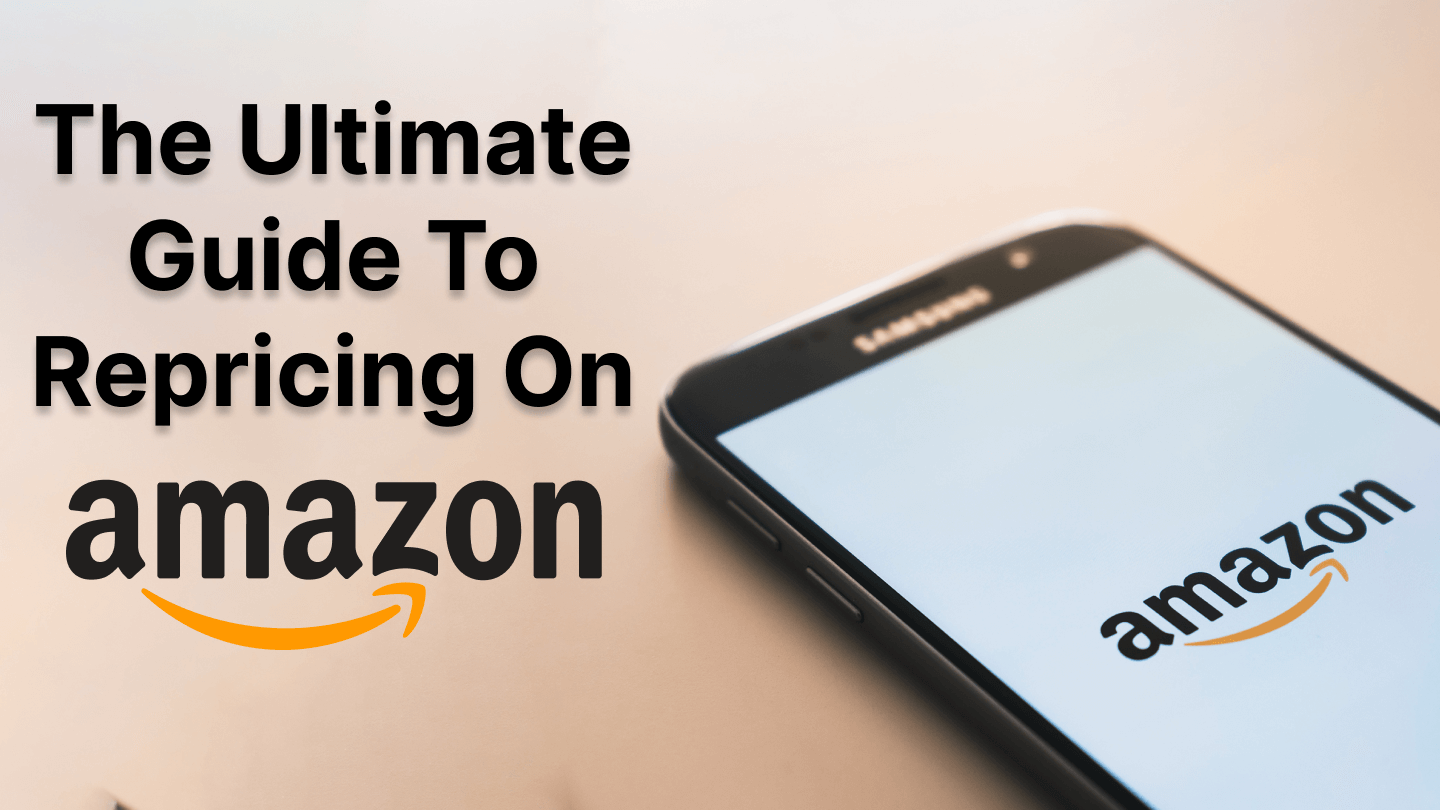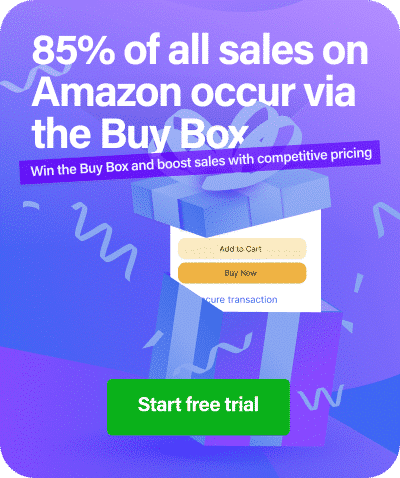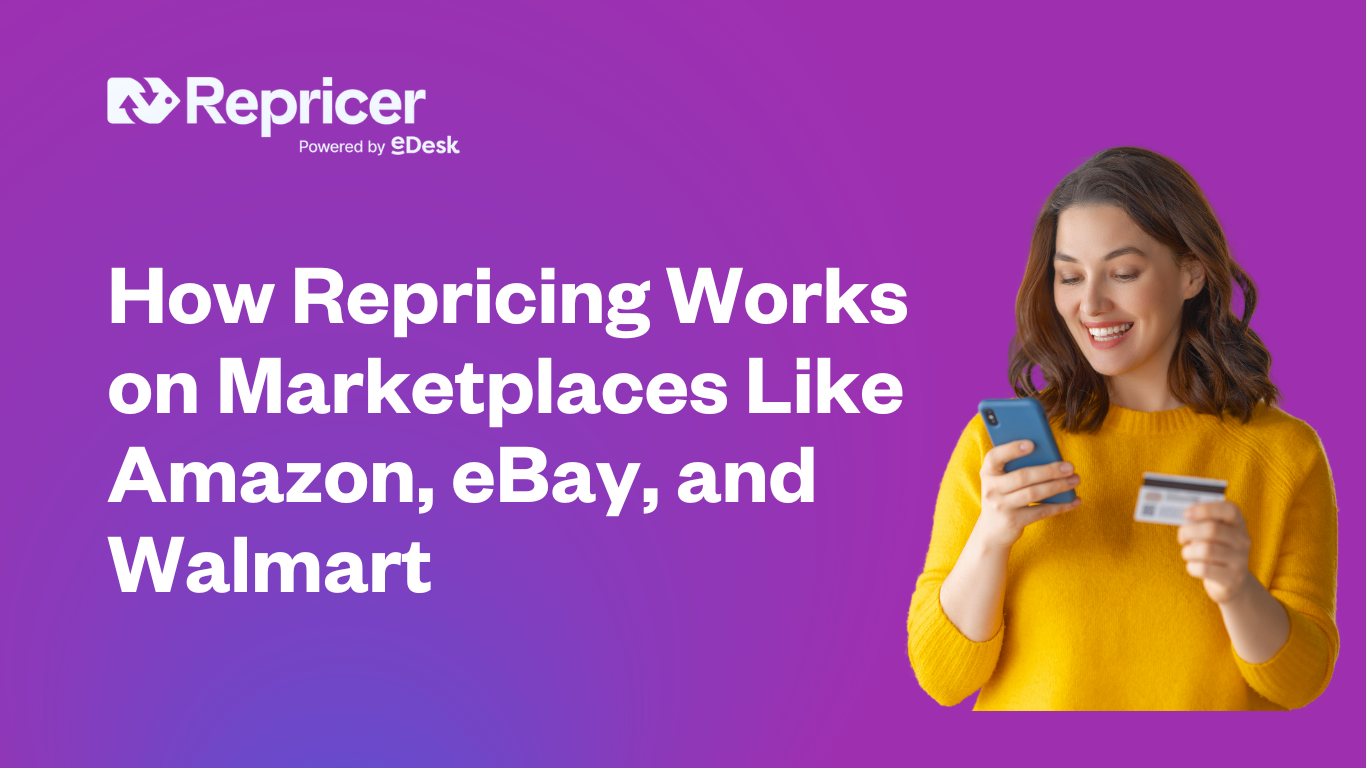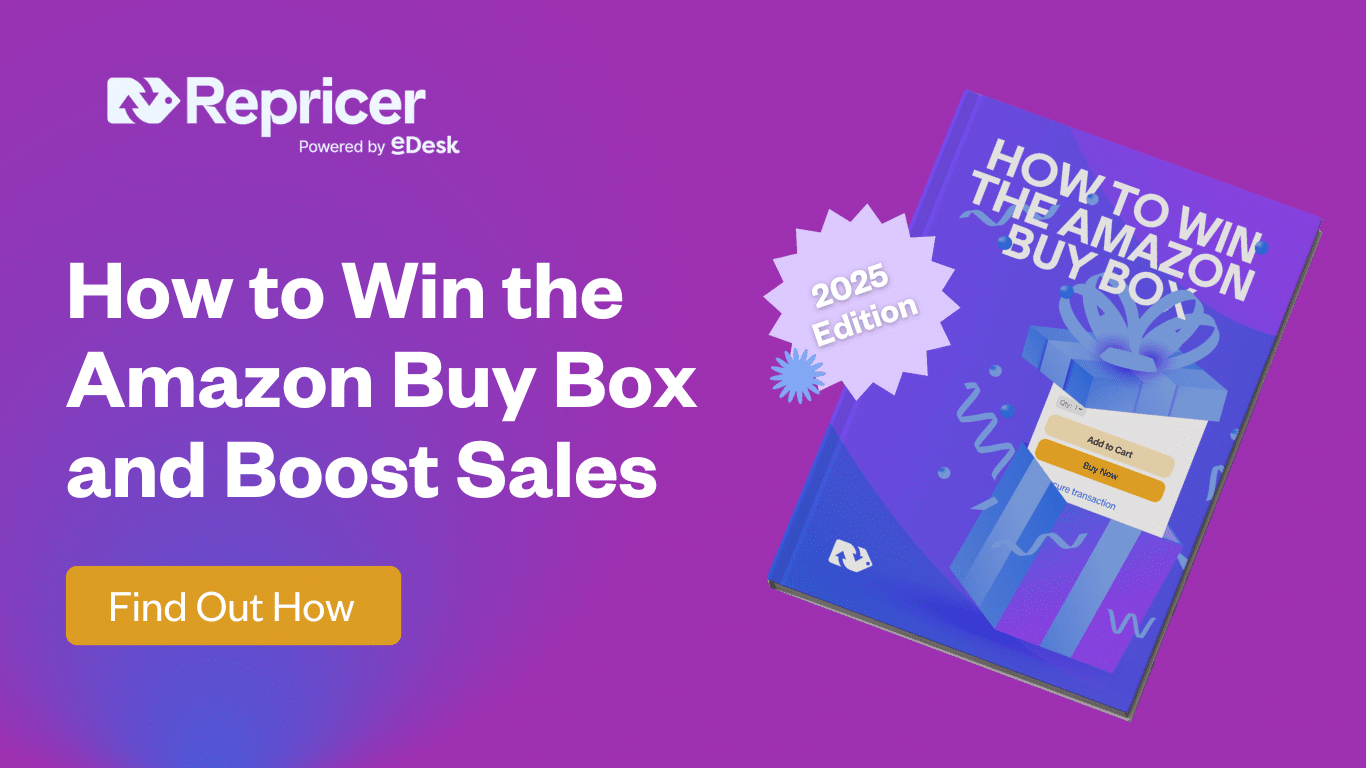Repricing on Amazon has never been more important for sellers. As you’re probably well aware, Amazon is a very competitive marketplace and you need to do everything you can to give your products the edge.
But what exactly is repricing and how can you use it to maximize sales? Here’s everything you need to know.
TL;DR
- Repricing is essential for all Amazon sellers to increase profits, and has several advantages, including winning the Buy Box.
- Repricing can be done either manually or automatically using various software.
- It’s worth making use of smart repricing strategies to boost your profits.
- Try Repricer.com to optimize your repricing strategies
Repricing: A Quick Overview

So, what is repricing, exactly?
If you visit a product on Amazon, check its price, and then return the next day, you may well find that the price has changed.
This happens millions of times every day on Amazon, and is repricing in action.
Precisely because competition is so fierce, sellers want to make sure their products are priced as competitively as possible—and they use repricing to do this.
Customers care about several factors when they’re choosing a product to spend their money on. The most important factor of all is usually price.
After all, all else being equal, a cheaper price is more attractive to most shoppers.
As a seller, you can do everything from marketing your products to optimizing the listing to help boost sales. But if your products aren’t competitively priced, you’ll miss out on sales.
That doesn’t necessarily mean always selling your products low to compete against the cheapest seller. Sell too low, and you miss out on profits.
Repricing is more about competitively pricing your products based on several factors (competition, supply and demand, seasonality, etc), to maximize sales and profits.
So, repricing is changing your product prices regularly to stay competitive. But there’s a lot more to know about it if you want to benefit from repricing.
Why Should You Reprice Your Products?
There are many good reasons to reprice your products on Amazon. Here are a few of the most important:
Win The Buy Box
This is the most important factor of all. When the algorithm chooses which items go in the Buy Box, you can increase your odds of success with the right pricing. And we all know what happens to sales when your product wins the Buy Box.
This is more important for arbitrage sellers because they have greater competition in the same listing. It’s different for private-label sellers because they’re almost guaranteed to win the Buy Box anyway, but it’s still important for them and can help to make their products more competitive.
Take Advantage of Sales
There are lots of times throughout the year when you can give your sales a huge boost, and you can maximize profits with a smart repricing strategy in place.
For example, there are seasonal events like Christmas, special events like festivals, and sales events like Black Friday (this year on Friday, 25 November) and Prime Day, where you can boost sales significantly.
Repricing properly can help to make your products stand out more at these times to take advantage of increased customer buying activity. You could then reprice your products higher again after the sale to make up for all the discounts.
Clear Out Inventory

If your inventory is stocking up with seasonal products or products with expiration dates, you may want to get rid of them sooner.
Having a good pricing strategy in place can be an easy way to get rid of them quicker.
Match Competitors
Repricing often comes down to simple supply and demand. When more sellers start selling the same product, you have more competition and you may need to reduce your prices to make your products more competitive.
If competitors reduce prices, you want to know what they’re doing and take appropriate action, whatever that might be.
Do Cheaper Prices Always Win?
If you’re new to repricing, you may assume that this is all about making your products cheaper. But that’s not the case.
A race to the bottom is rarely in your interests, after all, so don’t assume that you should always go for the lowest price. At the end of the day, you need to make a profit from your sales.
You should, therefore, have a system that will allow you to increase as well as decrease your prices.
Remember: Cheap doesn’t always mean better value. Many buyers won’t just look at price alone; they’ll also consider factors including quality, shipping time, good customer service, five-star reviews, and a better-quality listing.
Repricing Methods
So, now you know what repricing is and why you should do it, how exactly do you go about repricing your products?
It’s time to think about actual repricing methods: manual and automatic.
Manual Repricing
Manual repricing is an option, and it may be the first choice you consider. However, it’s only really a suitable option if you’re selling a small number of products.
A manual repricing strategy involves carrying out daily competitor analysis and editing your listings based on your findings.
You can do this in Seller Central, where you can quickly see if you have the lowest price or not. You can then choose to match the lowest price or set your own price.
This type of repricing method can, as you might expect, be quite time-consuming. As such, it could take up valuable time that you could be spending on other areas of your business, like marketing and customer service.
But manual repricing can be a good option when you’re starting out with just one or two products, and it can help you to get your head around the whole process.
Automatic Repricing
Most sellers use automatic repricing tools instead of doing the work manually. Repricing software is designed to automate the process to a large degree while still giving you full control over your strategy. So, based on whatever your competition does, you can ensure you remain competitive without taking part in a race to the bottom.
You can choose between rule-based repricing or algorithmic repricing.
With rule-based repricing, you set your own rules for specific situations. Depending on what your competitors are doing, you can tell the repricer what to do in different situations. For example, you could set the repricer to always make sure your products are a certain amount cheaper than your competitors.
Algorithmic repricing goes even further. This makes use of machine learning to look beyond your competitors’ prices alone and use trends and seller metrics to reprice more efficiently.
The software then changes the prices of your products for you based on set strategies. If you want to own the Buy Box, for example, or sell a certain amount of products during a set period of time, you can set your repricing software to do this.
Top Amazon Repricing Strategies for Success

Your aim with repricing should not simply be to make your products the cheapest to get more sales. Selling at a loss is rarely the right tactic to boost profits. With that in mind, how can you increase your profits with repricing strategies? Here are some of the top strategies to consider.
Get Into the Buy Box
You should always aim to win the Buy Box to increase your sales, and price is a factor.
As well as focusing on repricing, you should also choose FBA to win the Buy Box and ensure you have healthy seller metrics like a high fulfillment rate and low returns. You should also avoid running out of stock.
When you’re in the Buy Box, you may even want to consider repricing upwards to the maximum price that will still attract customers, to increase profits.
Set Minimum and Maximum Prices
However you go about your pricing strategy, make sure you know your minimum and maximum prices, and always set these in the software you are using.
Choose the lowest price you want to sell for under any conditions (the minimum price), and the same with the highest price (the maximum price). Don’t forget to consider the total cost including shipping costs, FBA charges, etc.
Enter these details into your repricing software, and the software will then adjust the prices automatically without going over or under your maximum and minimum prices respectively based on your competitors’ activity.
When demand is high and supply is low, the price will go up, helping you to increase profits. But you will also avoid pricing too low and selling at a loss, still while keeping your price competitive.
Know Your Competition
You don’t want to compete with all other sellers on Amazon because this will only end up leading to a race to the bottom.
For example, if you’re an FBA seller, that means you’re not competing with non-FBA sellers. You’re at an advantage because you’re eligible for Prime. Compete against sellers who are in a similar situation as you.
Choose your competition wisely when setting your rules and focus on staying profitable.
Consider Inventory Age
When products are expiring, the smart thing to do is get rid of them quickly—and lowering the prices can help you to do this.
Whenever you have products that aren’t shifting and you want them to move faster, consider repricing lower to speed up sales. A small reduction in your profit margins is better than not selling at all.
Prioritize Products
You don’t have to focus on all of your products. If you have a large number of products that you’re selling on Amazon, start out by choosing the ones that will make the biggest difference to your profits by repricing.
For example, perhaps you have some higher-priced products that aren’t selling so well. You might consider repricing these downwards to give your sales a boost without hurting your profits so much.
Plan for Seasonality
If you sell Christmas products, and the Christmas season is ending, consider repricing lower to shift them. Repricing can help to shift items sooner before you end up getting stuck with them for another year.
Consider the Condition of Products
Condition is another essential factor to consider when repricing. Always take the condition of products into account to avoid trying to compete against dissimilar products.
For example, if your products are used or not in great condition, don’t automate your repricing strategy to compete against a new product. In this case, you won’t be competing on the same level.
Keep an Eye on the Competition
If you’re using some kind of Amazon repricer tool, it’ll do most of the work for you. But don’t forget to check your competition manually too.
You don’t need to spend long doing this, but a quick check every week can give you even more insight that you can use to change your repricing rules.
Keep on Learning
Repricing is an ongoing process, so avoid simply setting and forgetting. You should constantly analyze your results and be willing to change things up based on your feedback and results rather than just changing things for the sake of it.
Use data to guide your strategy and identify the products that need more focus.
Double Check Your Settings
It’s obvious, but it can be a very costly mistake. When you’ve entered your settings, especially for the minimum price, always double-check before you hit enter.
If you set a minimum price lower than you intend to, you could end up seriously out of pocket.
How Repricer.com Can Help
Repricer is a repricing tool that makes the whole Amazon repricing process easy. It’s packed with smart features including an Amazon Buy Box Predictor, velocity repricing, scheduler, net-margin repricing, and lots more.
At Repricer, we’ve made it easy to track everything. Our repricing tool automatically alters the price of your products based on your rules settings, like the minimum and maximum price.
As such, it helps you to stay competitive every hour of the day and boost sales. It offers a huge amount of customization and even works on other marketplaces like eBay and Walmart among others.
You can currently try Repricer on a free 14-day trial, which is well worth it if you’ve only ever manually repriced your products before, and you’re not sure whether to commit to an automated repricing software.
Conclusion
Repricing is essential for Amazon sellers because it helps your products to remain competitive so you can increase your profits.
No matter how many products you sell, you need to know when to reprice your products and how. Repricing software like Repricer makes the whole process easy by automating the process based on your goals, saving you time that you can put into other aspects of running your business.
Don’t miss the opportunities that repricing provides for your business. Whether you opt for manual or automatic repricing, make sure you pay attention to repricing and optimize your strategies to boost profits.





